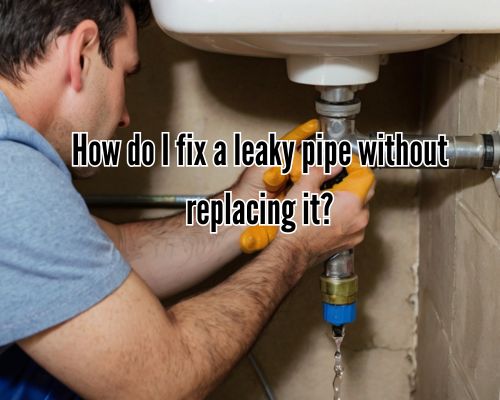A dripping pipe can feel like a minor annoyance—until you realize it’s silently hiking up your water bill, warping your walls, and inviting mould into your home. For homeowners in Warragul, Victoria, where seasonal rainfall and rural plumbing challenges add unique pressures to water systems, knowing how to fix a leaky pipe without replacing it can save time, money, and headaches.

In this guide, we explore practical, professional-approved techniques for fixing leaks without full pipe replacement—especially relevant to the Warragul region’s older homes and rural properties. Whether you’re dealing with copper piping, PVC, or flexi hoses, we’ll walk you through what works, what doesn’t, and when to call a local plumber.
Understanding the Cause Before the Cure
Before you grab a wrench or epoxy, you need to diagnose the leak. Pipe leaks in Warragul homes are commonly caused by:
- Corrosion (especially in copper and galvanised steel pipes)
- Loose fittings in bathrooms or under sinks
- Cracked PVC pipes, particularly in garden or irrigation systems
- High water pressure due to rural tank-fed or bore-fed systems
- Frost-related expansion during Gippsland’s colder winter months
These issues are fixable without full replacement—if caught early.
Quick-Action Leak Fixes That Don’t Require Replacement
Here are six reliable methods to fix a leaky pipe without replacing it, used by both DIYers and professional plumbers across Warragul and the wider Gippsland area.
1. Pipe Repair Tape (Silicone or Self-Fusing)
Best for: Temporary fixes or pinhole leaks in copper, PVC, or poly pipes.
Available at local hardware stores like Bunnings in Warragul, pipe repair tape wraps tightly around the damaged section. It fuses to itself to create a waterproof seal.
✅ Pros:
- Easy for beginners
- Works underwater
- Non-toxic and affordable
⚠️ Cons:
- Only temporary
- Doesn’t work well on high-pressure mains leaks
2. Epoxy Putty
Best for: Small cracks or gaps in metal or plastic pipes.
This clay-like material hardens after application, creating a solid patch over the leak. It’s especially effective on hot water systems and irrigation lines used around rural Warragul properties.
✅ Pros:
- Heat resistant
- Permanent if properly applied
- Can be sanded and painted
⚠️ Cons:
- Pipe must be dry
- Requires precise application
💡 Tip: Turn off water at the mains shutoff valve—often located near your water meter in rural areas—before applying.
3. Rubber Pipe Clamp or Sleeve
Best for: Medium leaks or joint failures on straight pipe sections.
A rubber patch and clamp kit allows you to compress a leak site using a metal bracket and durable rubber gasket. It’s commonly used in agricultural settings around Warragul for fast irrigation repairs.
✅ Pros:
- Durable
- Quick installation
- Available in multiple diameters
⚠️ Cons:
- Limited to accessible pipe sections
- May require tools
4. Compression Fittings
Best for: Leaks at pipe joints or couplings.
These fittings, often used in under-sink plumbing, apply pressure with a rubber washer to create a seal. You’ll need to cut out the leaking section and insert the fitting—a bit more advanced but very effective.
✅ Pros:
- Semi-permanent
- Professional-level result
- No glue or solder required
⚠️ Cons:
- Requires cutting tools
- Not ideal for high-pressure or deep underground systems
5. PVC or Copper Pipe Repair Sleeves
Best for: Linear cracks on visible or accessible pipes.
These sleeves, available at local plumbing supply stores in Warragul, slide over the damaged area and seal via rubber gaskets or adhesives. This method is common in bathroom renovations or temporary repairs before a full pipe refit.
✅ Pros:
- Durable and professional
- Great for visible piping
- Can be removed later
⚠️ Cons:
- Specific to pipe material
- Might require pipe cleaning or drying
6. DIY Garden Hose Method (Temporary Rural Hack)
Best for: Emergency irrigation leaks on remote rural properties.
In the farming outskirts of Warragul, a classic bush fix involves cutting a piece of old garden hose, splitting it lengthwise, and clamping it over the pipe with hose clamps. It’s old-school, but in a pinch—it works.
✅ Pros:
- No special tools needed
- Uses materials on hand
⚠️ Cons:
- Extremely temporary
- Not suitable for indoor plumbing
When to Call a Licensed Plumber in Warragul
Even if you’ve done a solid temporary fix, some pipe issues signal deeper problems. If you notice:
- Water discolouration
- Mould or mildew odour
- Water pooling under foundations
- Decreasing water pressure
- Multiple leaks over time
…it’s time to call a local plumber.
🔧 Plumber’s Insight: Fixes like epoxy or compression fittings buy you time—but aren’t always a permanent solution. Local plumbers recommend professional inspection at least annually, especially in Warragul’s older Federation-style homes.
Local Plumbing Considerations in Warragul, VIC
Warragul’s Gippsland soil, high mineral content in groundwater, and occasional frost events can strain plumbing systems in ways not common in metropolitan areas. Here’s what locals should keep in mind:
- Rural tanks or bore water systems may generate higher sediment buildup, leading to clogs and pipe wear
- Colder winters in the Drouin-Warragul corridor may cause pipe contraction and leaks
- Tree root invasion is a major cause of underground pipe cracks—especially in heritage areas near Victoria Street or Brandy Creek
Working with a local plumber familiar with these issues ensures you’re not using a generic fix for a region-specific problem.
Preventive Maintenance = Fewer Pipe Leaks
Even a solid leak fix is only part of the long-term solution. Here’s how to prevent future pipe issues:
- Install pressure regulators on tank-fed systems
- Flush pipes quarterly to clear debris
- Use pipe insulation in winter months
- Schedule annual plumbing inspections
- Avoid chemical drain cleaners, which corrode internal pipe linings
Final Thoughts: Fix Smart, Not Fast
If you’re wondering “How do I fix a leaky pipe without replacing it?”, the good news is—yes, you can. And in a place like Warragul, with its unique mix of rural infrastructure, residential diversity, and seasonal weather shifts, being proactive with minor repairs can prevent major costs down the line.
Always remember: temporary fixes buy time, but preventative care and local expertise buy peace of mind.
